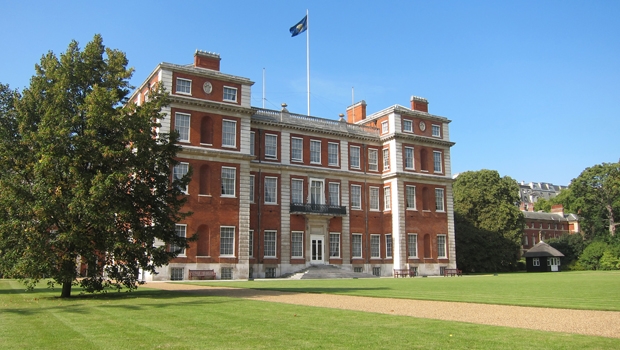
[Dr Carl Wright is Secretary-General Emeritus, Commonwealth Local Government Forum, a member of the Editorial Advisory Board, Commonwealth Round Table and a member of the Commonwealth Parliamentary Association. Opinion pieces do not reflect the position of the Round Table Board.]
I have worked in various full-time Commonwealth capacities since 1980, including as Assistant Director at the Commonwealth Secretariat. I have witnessed many Commonwealth schisms – over apartheid, Zimbabwe, Sri Lanka and much else. Yet the crisis facing the Commonwealth in 2020 is the worst I can remember.
Just four months before Commonwealth Heads of Government meet in Kigali, the Commonwealth Secretariat, led by Secretary-General Patricia Scotland, is undergoing political, administrative and financial convulsions. The present malaise is not a new one and has been in evidence for at least a decade; it has however got significantly more acute.
There has been highly negative media coverage concerning alleged actions of the Secretary-General with regard to spending, contract allocations and staff issues. Initially, I was dismissive of what seemed unfair personalised attacks from a traditionally xenophobic section of the British media. Yet when the same damaging allegations are apparently confirmed by an official audit report and employment tribunal judgements and are reported extensively on the BBC, they must be taken seriously.
I cannot recall a time when the Commonwealth has had less influence in safeguarding standards of democracy and good governance among its own members. Nor is the Commonwealth leading on key global issues such as sustainable development or climate change. Already when I was attending UN negotiations on the 2030 Agenda in New York in 2014-15, Commonwealth Ambassadors there were asking me why the Secretariat was not there to support them, and the situation has not much improved since.
Administratively and financially, the Secretariat has been on a downward spiral with major cuts in budgets and staffing. Its operational strength is a fraction of what it was when I worked there 20 years ago. Following Canada, Britain and New Zealand have now stopped voluntary funding of the Commonwealth Fund for Technical Cooperation, CFTC; Australia has also made significant cuts. There is no sign of other countries making up the difference.
Now the Secretariat us unable to maintain its lease on Commonwealth House and it has crammed remaining staff into Marlborough House. This forced the dissolution of the Commonwealth Hub based there, comprising the Commonwealth Games Federation, Commonwealth Local Government Forum and Royal Commonwealth Society. I had helped set up the Hub in 2016 to encourage greater coordination among Commonwealth bodies and it was launched with great fanfare by the HM the Queen.
In contrast to the Secretariat many other Commonwealth quasi-governmental, professional or civil society organisations are doing well. Indeed, these wide-ranging networks are a core strength of the Commonwealth. They include bodies that made up the former Commonwealth Hub, and other long-established organisations such as the Commonwealth Parliamentary Association or the Commonwealth Telecommunications Organisation. They also comprise brand new organisations like the Commonwealth Road Safety Initiative. Yet all stand to be hurt by association by the trashing of the reputation of the Secretariat and resultant withdrawal of support by the UK and other Member States.
With Kigali approaching what needs to be done? How can the Commonwealth be revitalised?
As a priority, the recommendations for reform made by Commonwealth governments in their 2011 and 2018 reviews need to be applied forthwith. These include those recommendations regarding the role and appointment of the Secretary-General. There needs to be dramatically improved leadership. If the Commonwealth is to revive, it needs a globally renowned and experienced political leader, ideally a Head of Government with sound international experience. This should be the main selection criteria for a new Secretary-General, not narrow considerations of geographical rotation.
In their reviews, Governments had repeatedly called for better coordination between the Secretariat and other Commonwealth organisations. Apart from the short-lived Hub, this has never been truly attempted. Given the demise of the CFTC, Governments should create a new multilateral Commonwealth Solidarity Fund. This would support actions by the Secretariat, such as promotion of democracy and Good Offices mediation. But it would also fund the work of the diverse Commonwealth organisations in areas like sustainable development, climate action and much more. To be meaningful, the new Fund should have at least £100 million annually, a small amount contrasted to the money member states pay to other intergovernmental bodies.
A radical approach is needed in Kigali if the Commonwealth is to survive and it is to be hoped that President Kagame, as incoming CHOGM Chair, will take a lead to ensure this. Having devoted the greater part of my professional life to service of the Commonwealth, I deeply hope that this great multilateral body will be given the life support it urgently needs so it is able to regain its former prominence in global affairs.
Dr Carl Wright
Secretary-General Emeritus, Commonwealth Local Government Forum, Editorial Advisory Board Commonwealth Round Table & Commonwealth Parliamentary Association (written in a personal capacity).
Related articles
Australia pushes for change of guard at Commonwealth Secretariat – The Sydney Morning Herald
Baroness heads for humiliating end to term at Commonwealth – Times of London
Exclusive: Baroness Scotland: Allegations ‘are a bid to stop secretary-general being re-elected’ – Eastern Eye
Baroness Scotland: Commonwealth faces uncertainty over leadership – BBC
The Commonwealth in conundrum – Syed Sharfuddin, former Special Advisor in the Political Affairs Division of the Commonwealth Secretariat
The Commonwealth without the Secretariat – Philip Murphy, Institute of Commonwealth Studies
External auditors give Commonwealth clean bill of health – Commonwealth Secretariat



